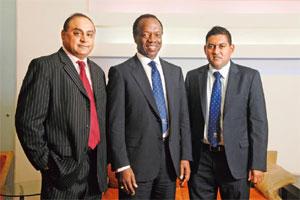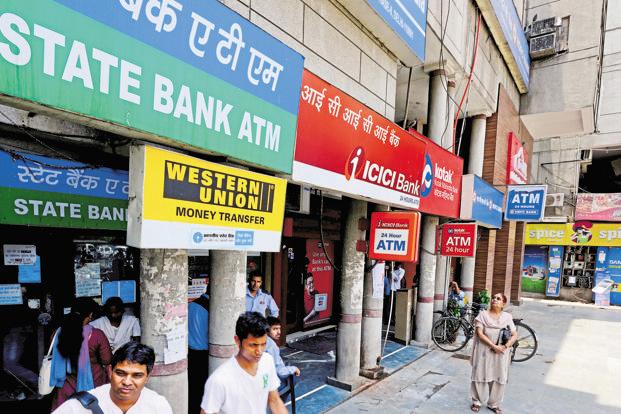Mumbai: FirstRand Ltd, the second-largest bank in South Africa in terms of assets, has launched retail and commercial banking operations in India. To begin with, the bank intends to exploit the growing trade linkages between India and Africa and focus on financial inclusion in a big way.
In an interview, Sizwe Nxasana, chief executive of FirstRand Group; Mahendran Moodley, country manager and CEO, FirstRand Bank, India, and Bobby Madhav, CEO, retail and commercial banking, FirstRand India, spoke about the lender’s long-term growth strategy in India. Edited excerpts:
You have been in India since 2009. Now, you are planning to get into retail. What are your plans?
Nxasana: You know the experience that we’ve had over the last three years where we started off with investment banking, fixed-income, currency and commodities has been really good. What we’ve been doing is to support Indian corporates that are doing business in Africa as well as African corporates, especially from South Africa, that are doing business in India. And that experience has really shown us that there are huge and increasing opportunities for trade between India and Africa as a whole.
As far as retail and commercial banking is concerned, there’s an increasing flow of visitors as well as business people who are doing business across the two countries or two continents. That’s why we see an opportunity for us to get into retail and commercial banking. Clearly, as we have more flow of business between India and Africa, it is absolutely important that we are able to provide assistance to non-resident Indians based in Africa, and to Indians who may be travelling to Africa.
Trade Linkages: Bobby Madhav, Sizwe Nxasana and Mahendren Moodley. Hemant Mishra/Mint
At the same time, we think we have a value proposition that we can add in India in terms of improving financial inclusion, especially considering the innovation and some of the platforms that we are using very successfully in Africa.
Barclays Plc tried twice to enter retail banking in India and failed. Deutsche Bank AG, too, was not successful. What is your game plan?
Nxasana: We take a very long-term view when we enter into any new country. We have got a lot of experience in starting new operations that we have done in quite a few countries, especially in Africa. But when you look at India, clearly as I said earlier, there is an increasing amount of trade and trade flow between India and Africa and we see a huge opportunity in the area in providing support to Africans who maybe doing business in India and vice-versa.
Talking about retail banking in India itself, clearly, we must understand that given the regulatory environment, there are limitations in terms of what we can do in India.
You are talking about not getting branches?
Nxasana: Of course, but even though there are limitations in terms of expanding branch networks and so on, there is a particular niche that we have identified that we believe we can be successful in. Our plans are modest—we don’t have big plans; we are going to take one step at a time.
We will start off by providing support and service to those customers who would be doing business and their links are between India and Africa and then modestly we will grow our presence in India as we go along, just like we have done in investment banking.
How has your experience been till now in India?
Moodley: My experience to date has been very positive.
Don’t be diplomatic.
Moodley: It has been positive.
You had mentioned regulatory restrictions.
Moodley: I think from both the government sector and the private sector, it has been positive. So let me start with the private sector, as much as India Inc. is banked and we think overbanked with foreign banks, there’s definitely a value proposition for us as a first-mover African bank in the market.
We are the first African bank licensee in this market. But again when you talk to promoters, CEOs, they want to talk to jurisdictional experts when it comes to new markets and we as an African-centric bank are a jurisdictional expert. So, that gets us in the doors with your Tatas, Birlas, Mahindras of this world who are entering Africa.
You have worked with some of the Indian companies that have acquired assets in South Africa.
Moodley: We’ve participated in some of the debt transactions in the Bharti-Zain instance. We’ve assisted Tata Communications Ltd with the financing stake in Neotel, (Pty) Ltd the second-biggest fixed line operator in South Africa and we have done various other transactions. We are very active in the commodities space between India and Africa. As you are aware, a large portion of South Africa’s gold comes into this market. Twenty-five percent of South Africa’s coal comes into this market and as Sizwe mentioned earlier, we have a large scale commodities practice.
One of the reasons for India’s rising current account deficit is the import of gold and several restrictions have been imposed. Will that affect your business?
Moodley: No, I think one can view it in various ways. We run a diversified business, we are not just a commodity-centric business.
With regard to gold and its impact on the current account deficit, we have seen initiatives by both the government and the private sector and products where gold investments can be monetized more effectively and flow into the capital market. We support those initiatives—be it gold ETFs (exchange-traded funds) investment products, etc.
I don’t see it really affecting business by virtue of the fact that these are new product offerings. We can also bring those products to the market. Back to your other point on how well we’ve been received, I’ve dealt with the private sector.
From a government perspective also, we are well received; there’s a big commitment by both governments to push trade and investment between both our countries and I think the branch licence is a testimony to the commitment.
How many more branches would you want?
Moodley: I think we are certainly looking for more branches as we expand, but we want to follow in a measured manner. I think what we will attempt to follow is a hub-and-spoke model, so build out a presence first in Maharashtra.
Maharashtra alone is five times the South African population—as big a market or bigger than the African market. We will follow in a very measured manner a hub-and-spoke model. I just want to emphasize Sizwe’s point that its a long-term view— we take a long-term horizon on these businesses. Our investment banking business has reached a good milestone, so we now have to build the next phase of our business.
What will your retail strategy entail?
Madhav: What we have done is that we have scouted the market, have found an opportunity within the non-bank sector and (are) really looking at Rs 10-15 lakh earners and looking at that space where there are unbanked people… We found that with our technology back home in terms of cell phones, e-wallets, etc., there’s a bucket of products that we can bring to this market and it is very niche.
If we cater to that market— because we are developing a product for this market which will be ready by July—there is something which we would like to take in this market.
We are also talking with a partner in the country to do our distribution in Maharashtra.
On the commercial side, as Sizwe has mentioned, the trade corridor space is big for us. We’ve been looking after the non-resident Indian companies in South Africa for a long time now… So, if you look at that space from the commercial banking side, we’ve been able to bank a few of our customers now in the country and also assist them for the corridor business for the expansion into Africa. Especially where we are present, it makes us much more comfortable as we understand those markets and we have the ability to advice our customers accordingly.
So, at this point of time, retail means reaching out to unbanked Indians.
Madhav: We have a very good value proposition on that end but nonetheless, we are not stopping at doing the normal banking to the customers.
Will you have banking products such as consumer loans, credit cards, auto loans and mortgages?
Madhav: We looked at the mistakes that everybody else had made. We decided that we will come in with a deposit-taking strategy and we will do a liability strategy. We will do secured lending in the market space and slowly, as we start building our client base, getting to the actual unsecured lending space.
But that will take time. At this moment in time, we will have the savings account, the normal current accounts, the debit cards.
What kind of rate would you offer on a savings account?
Madhav: As a new bank entering the market space, we are offering 7.25% for savings accounts of Rs 1 lakh and above.


